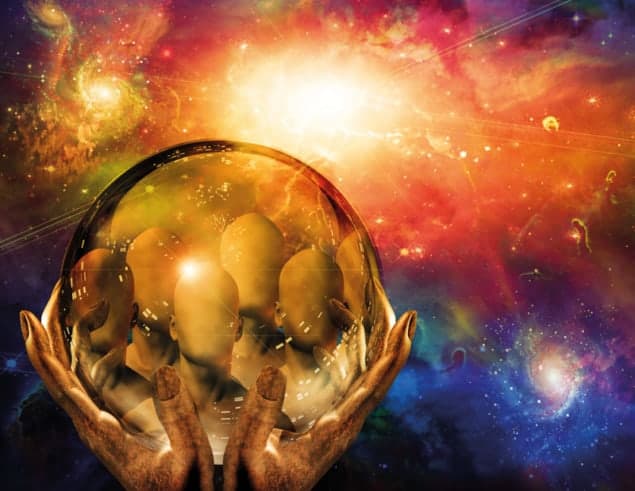The Atheist's Guide to Reality: Enjoying Life without Illusions
Alex Rosenberg
2011 W W Norton £17.99/$25.95hb 368pp

The evolutionary biologist and prominent atheist Richard Dawkins has often lamented the fact that physicists are much less antagonistic to religion than biologists are. He attributes this split to biologists’ greater familiarity with Charles Darwin, who showed clearly that humans could evolve by natural selection without any need to invoke divine intervention.
I, on the other hand, think that we physicists are friendlier to religion simply because, in the final analysis, we are closer to God. Before anyone jumps all over me, let me clarify that I am using the word “God” purely metaphorically. In other words, in my language, as in the language of most physicists, “closer to God” simply means “more fundamental”. Physics is the most fundamental of sciences because chemistry is really just an application of quantum physics, and biology is completely underpinned by organic chemistry. This description must be taken with a grain of salt, since no-one really knows how to formally derive chemistry and biology from quantum physics. However, most physicists believe that all natural sciences are fully compatible, and that if you look closely enough at any of them, you will find physics principles at work.
Given my strong physics bias, I was particularly delighted when Physics World asked me to review The Atheist’s Guide to Reality. Author Alex Rosenberg is a philosopher at Duke University in the US, and he subscribes to exactly the reductionist logic I summarized above. As he puts it, “physical facts fix all facts”, and there are no phenomena in this universe (including not just chemistry and biology, but psychology and sociology as well) that cannot be explained from the laws of physics. His book is basically an exposition of the philosophy that, he argues, naturally follows from this world-view. For lack of a better word, he calls this world-view “scientism” and the resulting philosophy “a nice form of” nihilism.
As the title of his book suggests, Rosenberg believes that if the laws of physics fix all the facts, this leaves no room for a god. His answers to other tough questions are similarly pithy. Q: Is there a soul? A: You’ve got to be kidding! Q: What is the nature of reality? A: What physics says it is (hence “scientism”). Q: What is the purpose of the universe? A: There is none (hence “nihilism”). Similarly, Rosenberg states that there is no meaning to life; you and I are here because of dumb luck; and the only lesson we can learn from history is that there are no lessons from history, because the random element in the universe prevents history from ever repeating itself.
Rosenberg’s book is well written and full of witty one-liners that will make you laugh. His advice for countering depression caused by nihilism, for example, is to pop a couple of Prozacs. He also makes a well-presented and plausible argument for why we find science counterintuitive – and why evolution has made us prefer storytelling to doing long and hard mathematical calculations. The gist of the argument is that survival requires us to make quick and dirty evaluations of other people and situations. Stories are a much better storage medium than formal mathematics for the rules of thumb we use to make decisions. This is why we prefer reading fiction to non-fiction and believe in myths despite a complete lack of scientific evidence.
Such arguments go a long way towards explaining why there is discord between our intuitive picture of reality (which includes supernatural events, gods, the simple division into “good and bad” and so on) and what science tells us is really at the core (i.e. nothing). However, this has all been seen before in the recent popular literature such as Geoffrey F Miller’s excellent The Mating Mind: How Sexual Choice Shaped the Evolution of Human Nature (published in April 2000 by Doubleday in the US, Heinemann in the UK). I have not really learned anything new from Rosenberg here, though he does tell it in an engaging and original way.
I am an atheist who likes to think that physics underlies all other sciences. But somehow, to my great surprise, the deeper I went into the book, the more I disagreed with Rosenberg’s conclusions. What bothers me most is the strength of conviction with which Rosenberg pursues many of his key arguments. For instance, he claims that natural selection follows from physics, and “The second law [of thermodynamics] makes evolution inevitable.” Inevitable? Really? If true, this is certainly news to physicists and biologists. In fact, many scientists maintain that, contrary to the purely reductionist picture I presented earlier, biology can never be derived from physics, not even in principle, even though both chemistry and biology are fully consistent with quantum physics. Even worse, physicists are still arguing about how to derive the laws of thermodynamics from microscopic dynamics. A subtle and intriguing point that Rosenberg misses is that the validity of thermodynamics is independent of the details of the microscopic laws. In other words, not only might physical facts not fix all facts, but some physical facts are not even uniquely fixed by other physical facts.
Rosenberg also claims that the laws of physics themselves can be explained (without a god) by taking a “multiverse” perspective. This argument dates back to the ancient Greeks, and especially to pre-Socratic philosophers such as Democritus, who in effect argued that all possible universes exist with all possible laws and we are merely living in one such universe. This is okay as far as it goes, but then Rosenberg claims that our best current theory suggests that our universe is one in a multiverse. Oh yeah? Our best current theory is the Standard Model of particle physics, and it suggests no such thing. And besides, what possible evidence can we have for other universes with other laws of physics? It is easy to see why the existence of all possible universes appeals to scientifically minded atheists, since it could solve the “Goldilocks” problem (our universe appears to be fine-tuned to our existence) without invoking a deity. However, this is not in itself a strong enough reason to promote it.
One could argue that the above flaws are only tangential to Rosenberg’s main point and ought to be forgiven in a popular-philosophical book. Fine. I, too, frequently cut corners when writing for popular audiences. But I think even Rosenberg’s broader philosophy misses the point of science, which is to remain in a state of suspended judgment: you make a conjecture and you wait to see what happens in experiments. It is precisely those who are unable to suspend judgment, who cannot wait or are scared to live without a definitive answer to every question, who need some kind of religion to give them comfort. In some sense this makes Rosenberg himself a religious person, even though he strongly embraces atheism. This might seem like a contradiction, but it is not: being “religious” in this sense does not necessitate believing in a god – a point well illustrated by the existence of communism.
There is something magical about science that is completely absent from Rosenberg’s cold and clinical philosophy. Feynman called physics “the most exciting adventure that human imagination has ever begun”. But not only is it exciting, it also requires a great deal of imaginative work. Its whole point is to enrich our world-view. In the words of the US naturalist John Burroughs, “the final value of physical sciences is its capability to foster in us noble ideals, and to lead us to new and larger views of moral and spiritual truths”. Regrettably, you will not find any of that in Rosenberg’s book. If you wish to read about the uplifting feeling that science really fosters, you would be much better off with Carl Sagan’s The Demon-Haunted World: Science as a Candle in the Dark.
- Buy now with 30% discount for physicsworld.com readers (enter code WN196 at the checkout)



